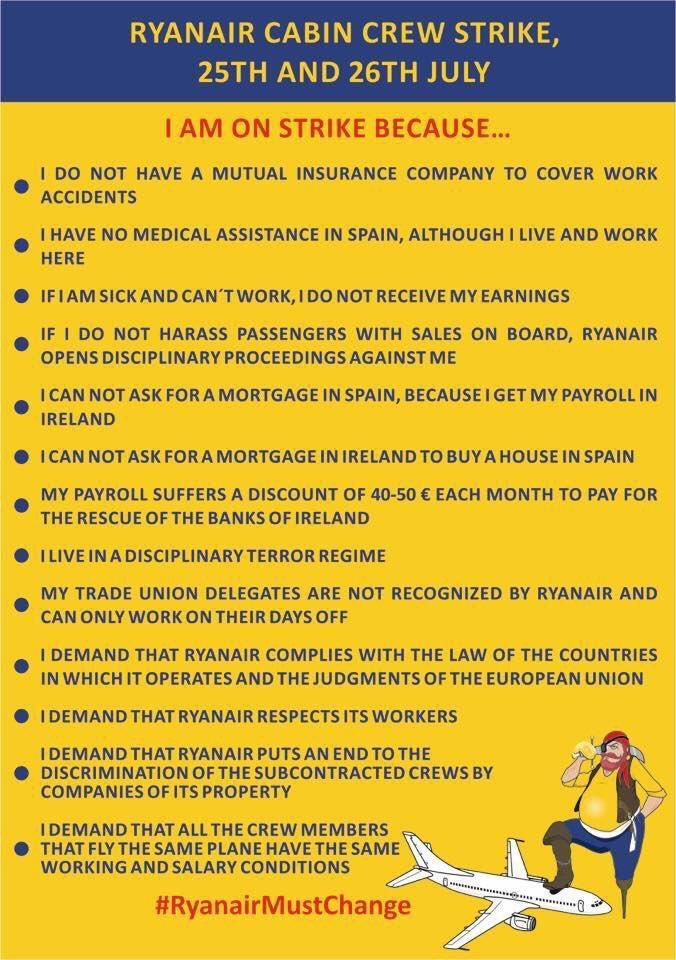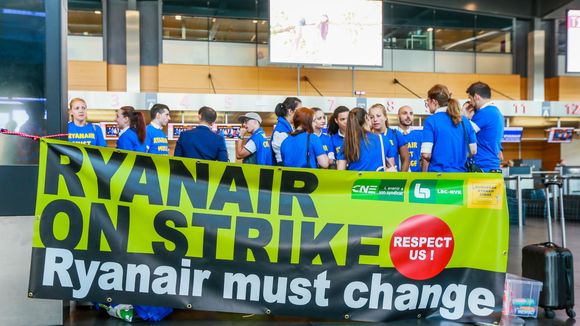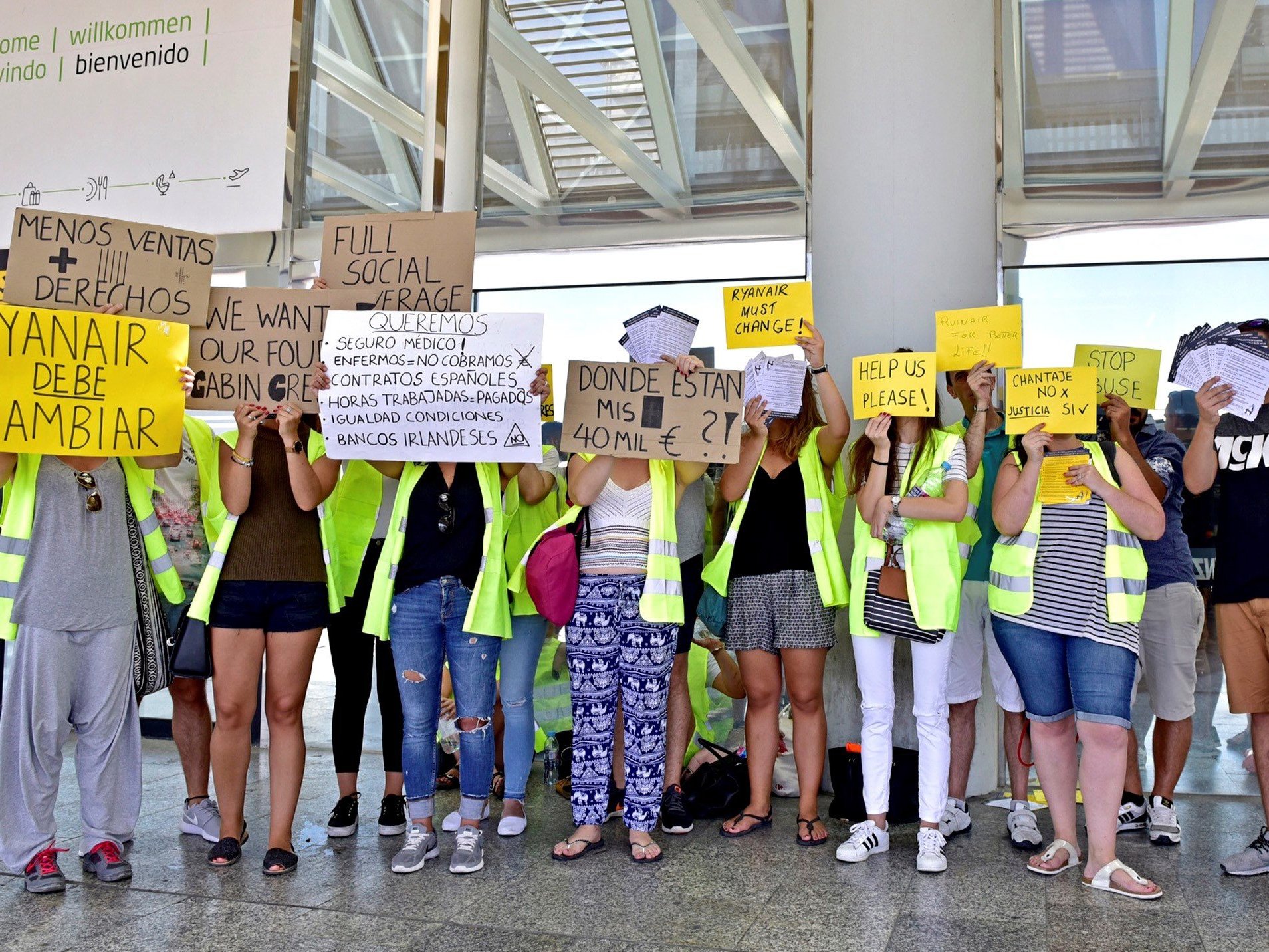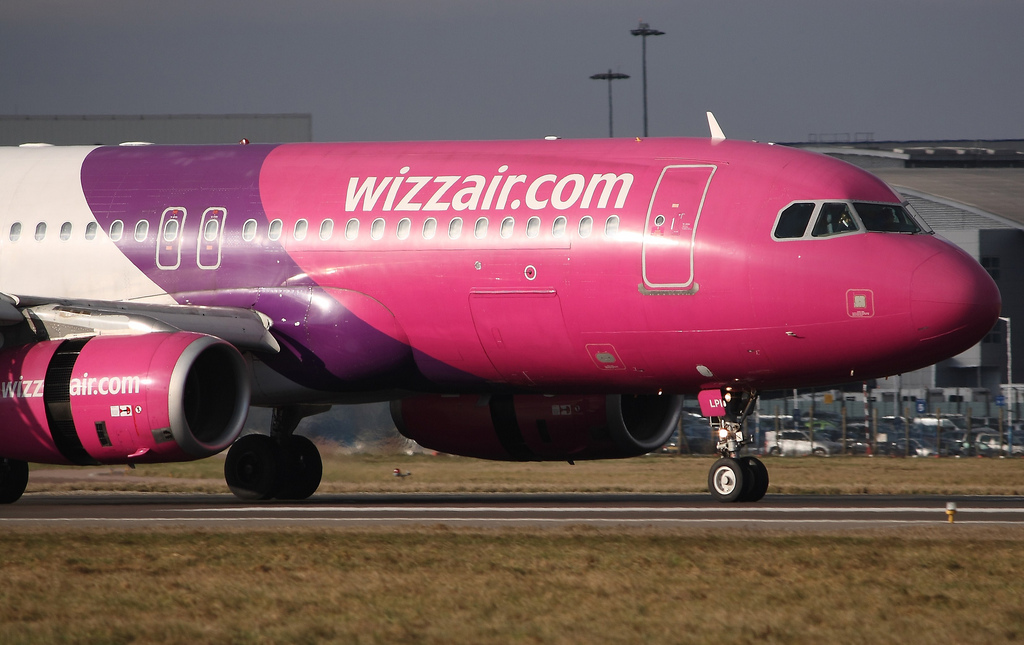Pilots and cabin crew at Michael O’Leary’s low-cost airline are bracing themselves for a battle with the bosses.
Ryanair doesn’t do strikes and unions. This assertion was true until recently. But we are living through interesting times.
The last week has seen the biggest strikes in the budget airline’s 34 year history. More than 600 flights have been cancelled, as cabin crew in Belgium, Spain, Italy and Portugal strike over pay and conditions. In Ireland it was the pilots who took action. They courageously defied the bullying tactics of management, staging a series of walkouts. Further strikes are set to follow in August.
Pressure mounts
 As we have reported in previous articles (see here and here), things have been heating up at Ryanair for a while.
As we have reported in previous articles (see here and here), things have been heating up at Ryanair for a while.
In early July, an important step was taken when Ryanair workers met at the offices of the Irish trade union Fórsa for the first ever Ryanair Crew Summit. A Ryanair Crew Charter was launched, outlining the changes the company must make in order to bring it in line with comparable employers.
Most of the document concerns cabin crew. The top demand is for “a fair living wage that reflects the work we do”. Other key concerns are over seniority pay; compensation for disrupted schedules; and an end to the extra costs incurred by cabin crew, including for uniforms and for food and water whilst on duty. It is an open secret that Ryanair cabin crew are under relentless pressure to meet sales targets during flights.
For the Ryanair pilots, pay is not actually part of their demands. What they do demand is: for Ryanair management to get serious about recognising unions; a transparent base transfer system; and a seniority agreement.
IALPA, the Irish Air Line Pilots’ Association, a branch of the Fórsa trade union, isn’t exactly a hotbed of radicalism. When dealing with the people in charge at Ryanair, however, you inevitably end up with confrontation. As IALPA’s notice of further strikes stated:
At every stage we have consulted our members, and they took the decision to proceed with the ballot and serve notice because they have seen no evidence whatsoever on the part of Ryanair management to engage in meaningful negotiations with a view to reaching agreement on the issues they have presented to the company.
In the view of our members, as reflected in the overwhelming majority who voted in favour of industrial action, your response falls far short of what is required to reach agreement. The response from members based on all of your letters is that it is once again an attempt by the management to avert a dispute, but with absolutely no intention of negotiating on what are considered to be very reasonable requirements.
As indicated in numerous previous letters, we are, and have always been, willing to meet you (subject to rostered duties) to discuss the issues. But the notice of industrial action stands, and it is the position of IALPA/Fórsa that the 24 hour stoppage will only be averted if agreement is reached on the 11 minimum requirements in a seniority agreement.
We have consistently suggested a neutral venue, which we will pay for, and it is beyond anyone’s understanding why you will not simply agree to this. It is yet another example of a Ryanair view which is “it’s either our way or no way”.
Escalation
 Their way or no way is a rather accurate summary of the current deadlock. It is no surprise then that the situation is only escalating.
Their way or no way is a rather accurate summary of the current deadlock. It is no surprise then that the situation is only escalating.
Ryanair is the master of spin, and management decided to pull a stunt by publishing some payslips allegedly from pilots flying for Ryanair. This was a desperate attempt to try and tarnish the “greedy pilots” who “are earning up to €150,000-200,000 per year”.
Not surprisingly, the mainstream media slavishly echoed these figures, thus fuelling the antipathy amongst the general public towards any strike action.
It is possible that a few select senior pilot managers reach this figure. But to use this as representative is laughable and dishonest in the extreme.
We say: let’s see the figures for the lowest paid pilots and the cabin crew hired on bogus self-employment contracts. Let’s see how much training debt they have outstanding – a sum that can reach over €100,000 for a lot of cadets.
In fact, Ryanair pilots never even asked for the 20% pay rise they were awarded recently. In a peculiar twist, this wage rise was imposed as a result of the crewing crisis seen last year and the pilot exodus from the company.
A minority amongst the pilot community said at the time that this excellent achievement would later be used to batter the union’s credibility during discussions on lifestyle issues, which affect – for example – the pilots’ right to have a family life. They may have had a point.
Fuel on the fire
 In what can only be described as a clear provocation, Ryanair reacted to the strikes by doing what it does best: bullying, intimidation and blackmail.
In what can only be described as a clear provocation, Ryanair reacted to the strikes by doing what it does best: bullying, intimidation and blackmail.
The bosses announced that they would reduce the airline’s Dublin-based fleet by one-fifth for the coming winter, and switch at least six aircraft to their Polish charter operation, Ryanair Sun.
About 100 pilots and 200 cabin crew have been given 90 days’ notice and face the sack. Their services “may not be required from 28 October onwards”. This notice simply added that staff would be offered transfers to Poland and possibly other bases.
This is quite astonishing given that Ryanair is still desperate for more flight crew and is actively recruiting. About 100 Ryanair pilots in Dublin went on strike, and now 100 pilot jobs in Dublin are under threat. This is obviously not a coincidence. It is a serious attempt at union busting.
The message is clear and was aptly summed up by one tongue-in-cheek commentator on BBC News:
“I never wanted a union and when you get one look what happens! So if you go on strike and try to bully me, then you will lose your job. But I won’t lose any money because I’ll simply send the aircraft elsewhere. You lose and I don’t. You have 90 days to capitulate.”
Unfortunately for the bullies, this belligerent behaviour will only backfire. Cabin crew across Europe on poverty wages and without basic rights have very little to lose. They will not stop their industrial action without significant progress in the talks, which so far have gone nowhere.
The pilots too are in a strong position, as their labour is very much in demand. They are a precious commodity. Interestingly, low-cost competitor Norwegian, also a 737 operator, was quick to begin poaching Ryanair’s pilots, promising better treatment.
Fight ahead
 It is clear, however, that the airline’s bosses are not going to back down without being forced to. After all, this is an airline that treats both its passengers and staff with contempt – for example, by refusing to pay any compensation to customers if there are cancellations.
It is clear, however, that the airline’s bosses are not going to back down without being forced to. After all, this is an airline that treats both its passengers and staff with contempt – for example, by refusing to pay any compensation to customers if there are cancellations.
The promise to recognise unions within Ryanair was a direct result of the scheduling chaos and crew shortages last year. The bosses had their backs against the wall and had no choice but to make concessions. However, at the same time, management has been stalling for some time, hoping for the winter season to cover the staff shortages.
Ryanair’s latest thinly veiled threat towards its own workers is short sighted. But the message is clear. Michael O’Leary and his cronies are throwing down the gauntlet and are testing the resolve of the strikers.
In an encouraging move, within three hours of Ryanair’s Dublin-downsizing announcement, the union called for another strike (on Friday 3rd August). Brace yourselves for impact.
The race to the bottom
 Union busting tactics are not confined to Ryanair. Take the Hungarian based low-cost carrier Wizz Air, for example. This airline now has a relatively large base in London Luton (eight Airbus aircraft) and intends to grab a share of the western European market. They pride themselves on being “ultra-low-cost” and are renowned for their low pay for both flight crew and cabin crew.
Union busting tactics are not confined to Ryanair. Take the Hungarian based low-cost carrier Wizz Air, for example. This airline now has a relatively large base in London Luton (eight Airbus aircraft) and intends to grab a share of the western European market. They pride themselves on being “ultra-low-cost” and are renowned for their low pay for both flight crew and cabin crew.
In the UK, anticipating Brexit, they recently received an Air Operator’s Certificate (AOC). They are therefore becoming a player to be reckoned with, as their cost base is lower than their western European competitors.
We have heard reliable first-hand stories of flight crew in Luton not being paid on time; some captains being underpaid by over £1,000 per month; other people being put on the wrong tax code as a direct result of the company’s actions; confusion about pension schemes, etc. In other words, a combination of negligence, malice, and incompetence.
Wizz Air workers have zero collective bargaining rights, as unions are simply not recognised. Just like at Ryanair, staff at Wizz Air are subject to various different contracts all over Europe – a strategy used to divide and rule.
To illustrate this anecdotally: we were recently doing some simulator training and were put up in a hotel by the company. In the same hotel were three female cabin crew from Wizz Air. To our astonishment, they had been forced to share a very basic room between the three of them while they were doing their five week initial training. During this period, apparently, they were not being paid at all. Don’t like it? Other people will take your place.
PS: on zero-hour contracts
Ever landed somewhere and had to wait for a while before being able to disembark the aircraft? Don’t blame the cabin crew or flight crew, who are doing their utmost to meet the ever-so-tight turnaround times. Usually this is in fact the result of ground handling not being available or being severely understaffed.
In Dublin, for example, this has been a big problem for a long time. There, like across most of Europe, ground handlers are on zero-hour contracts and minimum pay. As a result, staff turnover is very high, leading to a disappearance of the necessary experience to handle aircraft.






